
Hello, my darlings!: Revisiting The Worker
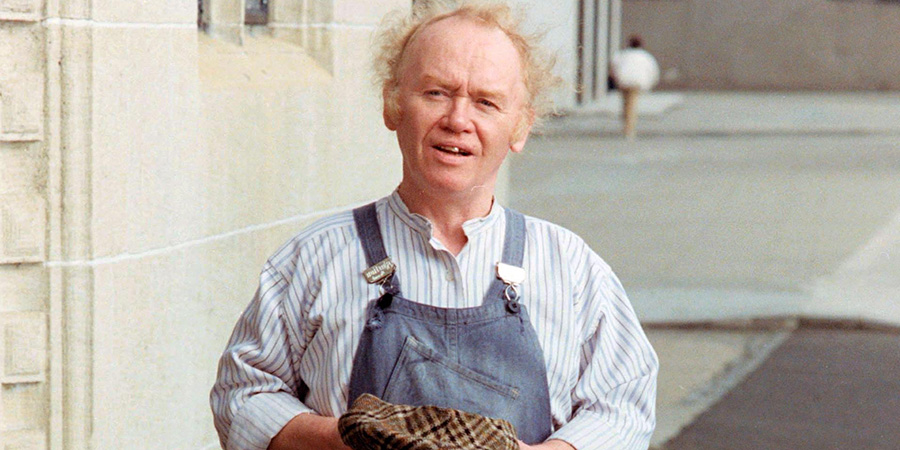
Considering how popular he was in his heyday, it's astonishing how far Charlie Drake has fallen out of the cultural conversation. This was a comic who sold out seasons at the London Palladium, spent years headlining his own television shows and starring in pantomimes. However, almost the only piece of cultural capital Drake has these days are appearances on Goes Wrong compilation-type shows in an oft-repeated clip of his being knocked unconscious in 1961.
The bit of physical business was to see him pulled through a bookcase that, instead of falling apart as had happened in rehearsals, had accidentally been nailed together by carpenters who were unaware of its intentional flimsiness. Not only did this initial blow leave him unconscious, but his fellow actors thought he was continuing with a 'bit' and completed the scene, hauling him through an open window. All during a live television broadcast. The result was a concussion, a fractured skull and the beginning of a particularly unsteady period in Drake's working life. He would not appear on television again for two years.
In 1963 Drake returned with a vengeance, first relaunching The Charlie Drake Show before starring in his own sitcom, The Worker, for ITV from 1965. It was a simple setup that saw Drake play a downtrodden everyman unable to hold down a job - not dissimilar to Michael Crawford's Frank Spencer a decade later - but Drake's character was far less sympathetic and more akin to Billy Bunter, perpetually picked on and oppressed by the world at large. His onscreen persona had always been leering and lascivious: his catchphrase "Hello, my darlings" alluded to the fact that, due to his short stature, his eyeline was often level with a woman's bosom.
Drake always had a stern authority figure to play against. In the first series, this was Percy Herbert as Mr Whittaker, but it is his replacement, Henry McGee as Mr Pugh - inevitably, often mispronounced as Mr Poo - who is best remembered. Each week he would make a wide array of angry faces as Drake's long-winded stories and puerile ponderings wound him up to breaking point, eventually grabbing his adversary by the lapels and hauling him over the desk. During these sequences, Drake would frequently address the camera, usually with a knowing look, or to emphasise a punchline, as a way of bringing the viewer into his world. Miranda would do the same thing nearly fifty years later.
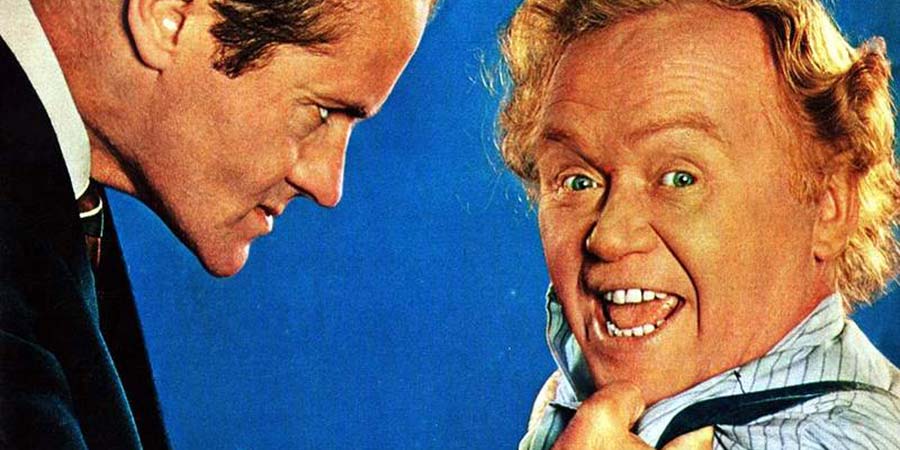
Though Drake was the star, it is writer Lew Schwarz who deserves most of the credit. Schwarz is one of the great unsung heroes of post-war British comedy, scripting episodes of The Army Game and its spin off Bootsie And Snudge before teaming up with Drake. Their partnership proved to be a fruitful one. Not only did they write several series together, but Schwarz also scripted two feature films for the star: Petticoat Pirates (1961) and The Cracksman (1963).
Schwarz would continue as a jobbing writer, and in 1969 the BBC teamed him with Carla Lane while she was creating The Liver Birds with Myra Taylor. In the 1970s, he went on to write the Carry On television series, Carry On Laughing, as well as Hark At Barker for Ronnie Barker, and two little remembered small screen star vehicles for Shirley Maclaine and Norman Wisdom: Shirley's World and A Little Bit Of Wisdom, respectively. He eventually coalesced his considerable experience and knowledge into a book, The Craft Of Writing Television Comedy, which was published in 1988.
In The Worker though, Drake's experience as a stage comic meant that much of the comedy came from simply holding the camera's gaze on his forlorn face. He knew exactly how long to milk each laugh. Take the opening episode of Series 2, in which he makes his entrance dressed in a giant mouse costume:
I had to go all the way to Finchley dressed like this! I got on the bus, asked the conductress for the fourpenny one, they're still trying to get her down off the roof! Then I met a cat. Dragged me up a back alley and played with me for half an hour.
He ends the episode going door to door as The Daffodil Man, culminating in a spectacular stunt that sees him thrown headfirst through a window onto the street.
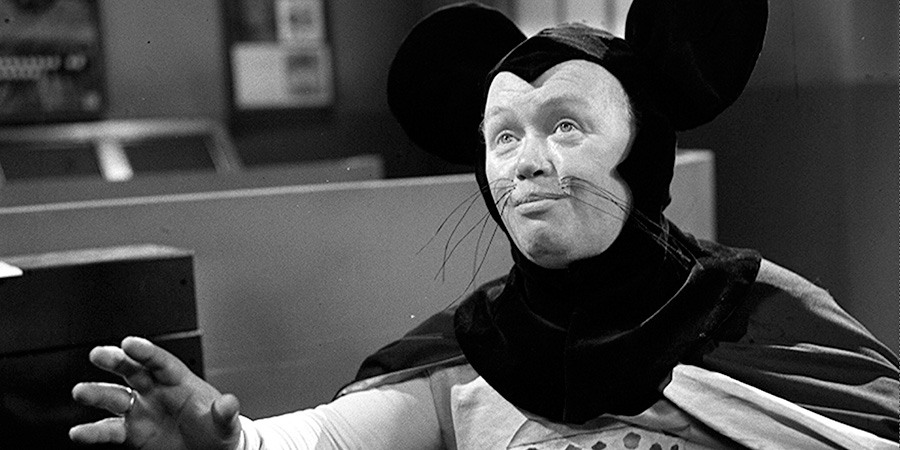
Most episodes followed a formula - Drake turns up at the Labour Exchange, the first half of the episode dedicated to his back and forth with the official. He would then be duly dispatched to his next job, where he would often introduce himself with the words "Good morning, I'm Charles Drake, casual labourer of Weybridge, come for the job in the vacancy". He would then attempt to execute said job and fail, leading to a spectacular slapstick finale.
As the series progressed, Drake and Schwarz began to break away from this format with episodes including fertility drugs, aliens, fishing, an edition of This Is Your Life, and the final episode, which saw McGee kicked out of his house and forced to move in with his unemployable nemesis, setting the scene for a series of odd couple jokes.
Drake was something of a perfectionist, especially when it came to rehearsing his slapstick sequences. He garnered a reputation for being incredibly difficult to work with: TV producer Michael Hurll, best known for masterminding The British Comedy Awards, said he was a "nasty man then and he stayed a nasty man - a horrible, horrible man".
His autobiography, Drake's Progress is a fascinating document that gives a thorough, if rather unpleasant, insight into what made Drake tick, painting a portrait of a man with an enormous ego, but a work ethic to match. Frequently suffering for his art, he claims to have "broken pretty well every bone in my body, and those I haven't broken, I've bent". Watching The Worker, this is not surprising in the least - the slapstick sequences were always shot wide. This was not only the best way of capturing the stunt, but it emphasised to the audience that it really was Drake taking all this punishment for the sake of their entertainment.
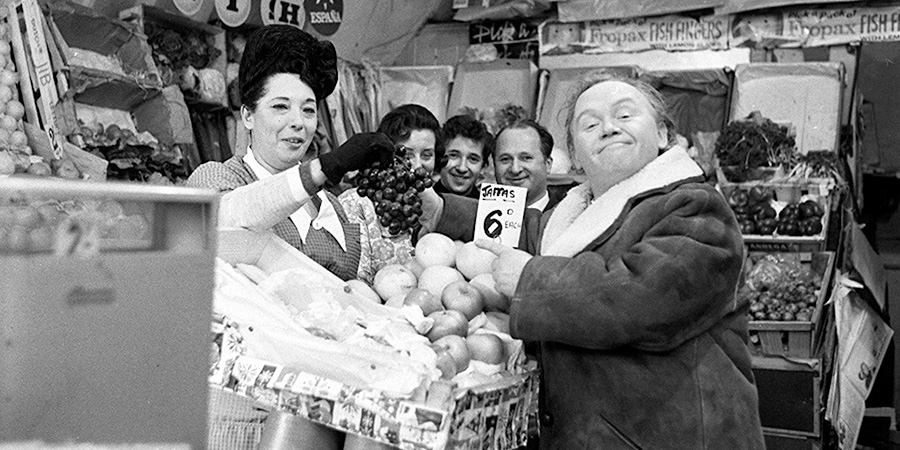
Though The Worker was primarily a two hander, guest stars did pop up across the show's 14-year lifespan. These included Norman Vaughan, Dalek operator John Scott Martin, Marcia Warren, Reginald Marsh, Windsor Davies and Frank Williams.
Originally ending in 1970, the sitcom was revived in 1978 as a run of sketches in Bruce Forsyth's Big Night, with Drake and McGee reprising their roles. Aside from an early, pre-broadcast version of Series 3's Hallo Cobbler, these are the only episodes of The Worker to exist in colour. They are included as an extra on the Network DVD box set of the series.
Back in the 1960s, Drake enjoyed a concurrent career as a popular singer. He performed the series' theme song, Only A Working Man, which had originally been written by Herbert Rule and Fred Holt in 1923 for Lily Morris, who performed it in the music halls. (It was subsequently used in 1930 comedy Elstree Calling, co-directed by Alfred Hitchcock.) Drake's 1961 record My Boomerang Won't Come Back went to number one in Australia, enjoyed a variety of other pop and novelty hits, and in 1975 the most unlikely collaboration ever occurred, when he worked with prog rock giants including Peter Gabriel and Phil Collins on the single You Never Know. The full story has been documented by Graham McCann in his Comedy Chronicles column.
Drake's popularity gradually declined as the 1970s wore into the 80s, and on further into 90s. He appeared in several of Eric Sykes's silent comedy films and enjoyed a move into straight drama, including an acclaimed performance as Smallweed in a television version of Charles Dickens' Bleak House, but his own comedy career was effectively at an end.
His final foray into comedy was as Baron Hardon in Jim Davidson's adult pantomime Sinderella, which was released on VHS in 1995. The same year, Drake suffered a stroke, after which he retired to Brinsworth House, a home for ill and elderly entertainers that has over the years also played host to Hylda Baker, Richard O'Sullivan and Mike Yarwood. Drake's final recorded performance saw him reprise the role in voiceover for the 2004 sequel Sinderella Comes Again. He died in 2006.
The Worker may be forgotten these days, but for its time it was a risky venture to produce a show featuring so much physical slapstick and stunt work. Drake was a superb physical comic, and it is sad that he is for the most part lost to the annals of showbusiness history. It may not be especially sophisticated comedy, but it was never meant to be. As pure entertainment and a showcase for the talents of its star, The Worker is a wonderful sitcom and a fascinating historical document of humour from a bygone era.
Where to start?
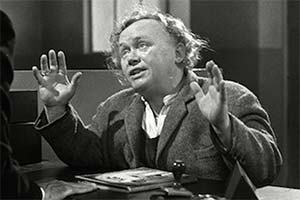
Series 3, Episode 5 - When Adam Delved And Eve Span
An episode that crashes full throttle into postmodernism, it begins with Charlie excited about the fact that he was chosen by a cameraman on the street that morning to do an interview for television. When the interview doesn't air, he strides purposefully down to Thames Television and demands to speak to somebody in authority, only to end up in a studio where he discovers he is an actor who stars in The Worker. This episode ranges from the traditional slapstick of a cake in the face to a Spike Milligan-eqsue sequence where the diminutive Drake is forced to scuttle back and forth down an impossibly long corridor.
Help us publish more great content by becoming a BCG Supporter. You'll be backing our mission to champion, celebrate and promote British comedy in all its forms: past, present and future.
We understand times are tough, but if you believe in the power of laughter we'd be honoured to have you join us. Advertising doesn't cover our costs, so every single donation matters and is put to good use. Thank you.
Love comedy? Find out moreThe Worker - The Complete Series

Charlie (Charlie Drake) is keen to work for his living but, unfortunately, he's completely accident-prone.
He's been visiting his local Labour Exchange regularly for over 20 years and has had nearly 1,000 jobs. He managed to get himself sacked from every one of them within hours of starting.
First released: Sunday 27th May 2007
- Distributor: Network
- Region: 2
- Discs: 5
- Catalogue: 7952674
![]() Buy and sell old and new items
Buy and sell old and new items
Search for this product on eBay
BCG may earn commission on sales generated through the links above.
Lew Schwarz - The Craft Of Writing Television Comedy

Almost everyone who watches TV comedy says that they could do it better. This is the book for the amateurs who want to be told by a real professional how they can have a go at it and actually get into it if they are any good.
In this unique book Lew Schwarz covers all you need to know: quickies; short sketches; long sketches; situation comedy; alternative comedy; and presentation and marketing.
First published: Thursday 1st December 1988
- Publisher: Allison & Busby
- Pages: 128
- Catalogue: 9780850319620
![]() Buy and sell old and new items
Buy and sell old and new items
Search for this product on eBay
BCG may earn commission on sales generated through the links above.
Charlie Drake - Drake's Progress: An Autobiography

For twenty-five years Charlie Drake was at the top of the UK show business ladder (films, TV, stage productions, 15 Royal Command performances, etc), but it all crashed after a row with Equity, and his career was in ruins. There followed the slow climb back, eventually to a new level of success outside his familiar world of variety.
First published: Wednesday 1st October 1986
- Publisher: Robson Books
- Pages: 224
![]() Buy and sell old and new items
Buy and sell old and new items
Search for this product on eBay
BCG may earn commission on sales generated through the links above.
- Publisher: Robson Books
- Catalogue: 9780860513704
![]() Buy and sell old and new items
Buy and sell old and new items
Search for this product on eBay
BCG may earn commission on sales generated through the links above.

